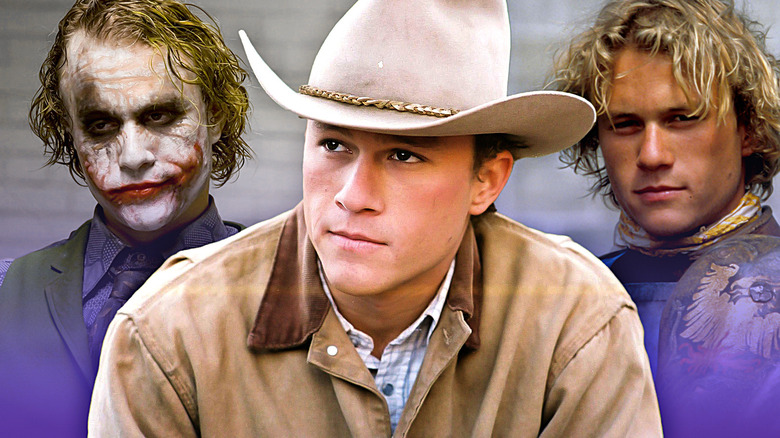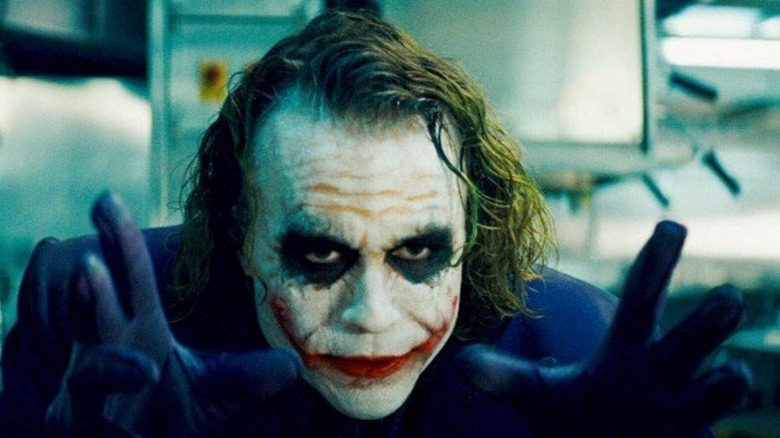Heath Ledger's Death Explained: How Old The Actor Was When He Died
Heath Ledger, the Australian native who became one of the most famous actors in the world before turning 30, died on January 22, 2008. Tragically, the actor was just 28 years old at the time of his passing.
Though it understandably took time for information about Ledger's passing to be confirmed, we now have a relatively clear understanding of what happened — or, really, as clear of one as possible while respecting the late performer's privacy. On that day in January 2008, Ledger's massage therapist Diana Wolozin found the actor unresponsive in his apartment, and Wolozin subsequently called Ledger's friend, actress and fashion designer Mary-Kate Olsen. Olsen's security guard reached Ledger's apartment before the authorities, where he was pronounced dead.
According to a later report in the New York Times, Ledger's death was due to a combination of prescription drugs in his system. A statement provided to the New York Times by New York City's chief medical examiner at the time declared, "Mr. Heath Ledger died as the result of acute intoxication by the combined effects of oxycodone, hydrocodone, diazepam, temazepam, alprazolam, and doxylamine. We have concluded that the manner of death is accident, resulting from the abuse of prescription medications." In all likelihood, Ledger, who admitted to taking sleeping pills while playing difficult roles like the Joker in "The Dark Knight," simply took this combination by mistake.
Heath Ledger had an amazing career that was cut too short
After leaving his hometown of Perth, Australia, Heath Ledger appeared in some small television shows before getting his big break in 1999 thanks to the teen take on Shakespeare, "10 Things I Hate About You." In the modern twist on "Taming of the Shrew," Ledger brought his winning charm to the bad boy Patrick Verona, who's tasked with "taming" the school "shrew" Kat Stratford (Julia Stiles). Ledger is irresistable throughout the film, and though it set him up as a romantic lead, he made canny choices and ensured that he would never be pigeonholed as a heartthrob.
Ledger went on to lead the medieval comedy "A Knight's Tale," star in the irreverent historical film "Casanova," and appear alongside Mel Gibson in "The Patriot," but it was Ang Lee's film "Brokeback Mountain" that proved Ledger was more than just a pretty face. The 2005 drama paired Ledger with Jake Gyllenhaal and cast them as two ranch hands who fall in love one summer while working together, and despite constant jokes about "the gay cowboy movie," anyone who watched "Brokeback Mountain" couldn't deny that Ledger was truly one of the most gifted actors of his generation. Then, the role of a lifetime came knocking — though it also created discord in Ledger's life.
After his untimely death, Heath Ledger won an Oscar and a dozen other awards
In 2008, Heath Ledger shocked the world with his bombshell performance in Christopher Nolan's "The Dark Knight" as the Joker, and the way he prepared for the role was extremely disturbing. To fully "become" the character, Ledger kept a "diary" in the voice of the demented clown and, as we previously mentioned, experienced terrible insomnia. There's no denying that Ledger's performance as the villain is absolutely electric, but it certainly wasn't worth the difficulties Ledger experienced.
Ultimately, Ledger won a posthumous Academy Award and other accolades for his role as the legendary "Batman" baddie, though it's devastating to imagine the kind of career Ledger would have had after winning his first Oscar at such a young age. The film is a testament to Ledger's talent, and sadly, it was likely a part of his final downfall as well.
If you or anyone you know needs help with addiction issues, help is available. Visit the Substance Abuse and Mental Health Services Administration website or contact SAMHSA's National Helpline at 1-800-662-HELP (4357).
If you or someone you know needs help with mental health, please contact the Crisis Text Line by texting HOME to 741741, call the National Alliance on Mental Illness helpline at 1-800-950-NAMI (6264), or visit the National Institute of Mental Health website.


